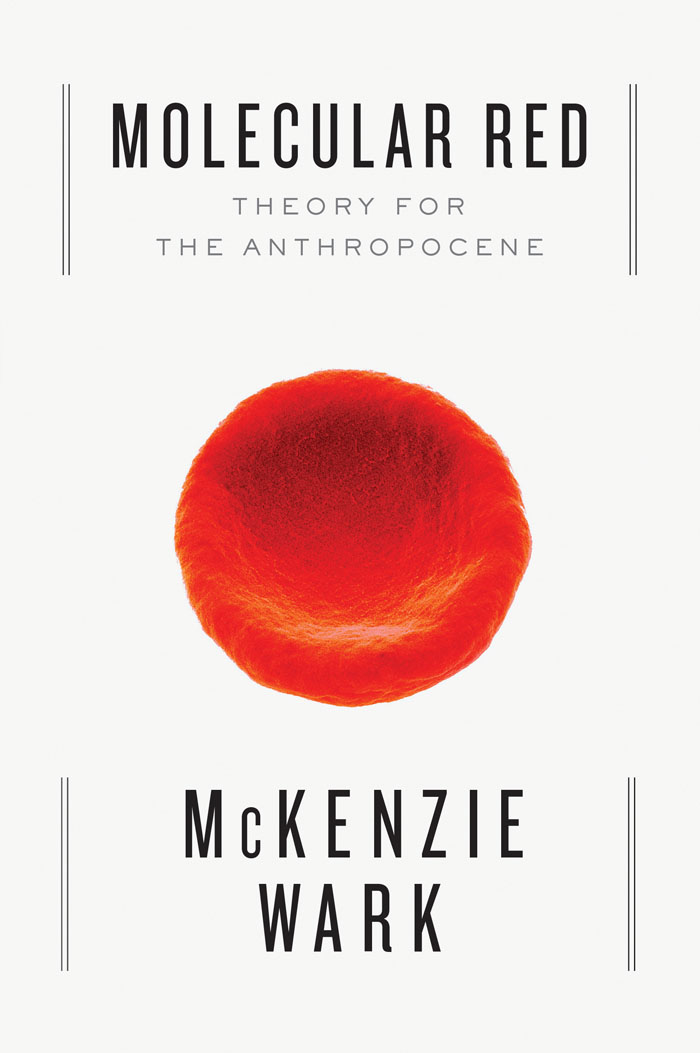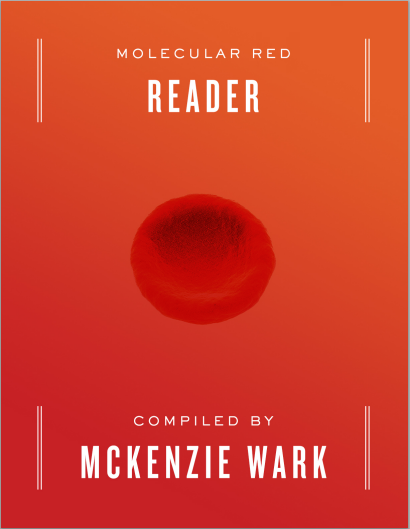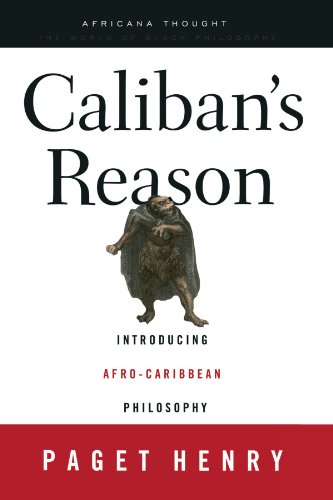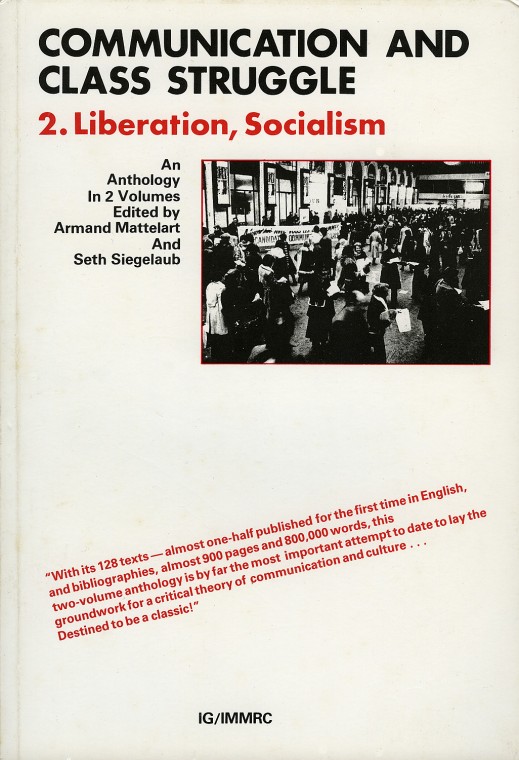McKenzie Wark: Molecular Red: Theory for the Anthropocene (2015)
Filed under book | Tags: · agriculture, anthropocene, climate, climate crisis, communism, cyborg, environment, knowledge, labour, literary criticism, marxism, nature, philosophy, production, proletariat, proletkult, revolution, science, science fiction, technoscience, tektology, theory, utopia


“In Molecular Red, McKenzie Wark creates philosophical tools for the Anthropocene, our new planetary epoch, in which human and natural forces are so entwined that the future of one determines that of the other.
Wark explores the implications of Anthropocene through the story of two empires, the Soviet and then the American. The fall of the former prefigures that of the latter. From the ruins of these mighty histories, Wark salvages ideas to help us picture what kind of worlds collective labor might yet build. From the Russian revolution, Wark unearths the work of Alexander Bogdanov—Lenin’s rival—as well as the great Proletkult writer and engineer Andrey Platonov.
The Soviet experiment emerges from the past as an allegory for the new organizational challenges of our time. From deep within the Californian military-entertainment complex, Wark retrieves Donna Haraway‘s cyborg critique and science fiction writer Kim Stanley Robinson’s Martian utopia as powerful resources for rethinking and remaking the world that climate change has wrought. Molecular Red proposes an alternative realism, where hope is found in what remains and endures.”
Publisher Verso, London and New York, March 2015
ISBN 1781688273, 9781781688274
xxiv+280 pages
Reviews: Slavoj Žižek (Verso 2015, Wark’s response), John Beck (Radical Philosophy 2015), Mark Rappolt (ArtReview 2015), Maria Chehonadskih (Mute 2015, Wark’s response), Two Grenadiers (2015), Pieter Vermeulen & Tom Chadwick (nY 2016), Jim Harper (LSE Review of Books 2016).
Commentary: Joe Guinan (Renewal 2015), Jernej Kaluža (Radio Student 2019, SL).
Video lecture (Concordia U, Apr 2015)
Publisher
WorldCat
See also Molecular Red Reader compiled by Wark (PDF).
Comment (0)Paget Henry: Caliban’s Reason: Introducing Afro-Caribbean Philosophy (2000)
Filed under book | Tags: · africa, caribbean, colonialism, consciousness, epistemology, existentialism, historicism, history of philosophy, knowledge, marxism, ontology, philosophy, poeticism, poststructuralism

“Caliban’s Reason introduces the general reader to Afro-Caribbean philosophy.
In this ground-breaking work, Paget Henry traces the roots of this discourse in traditional African thought and in the Christian and Enlightenment traditions of Western Europe. Since Afro-Caribbean thought is inherently hybrid in nature and marked by strong competition between its European and African orientations, Henry highlights its four main influences–traditional African philosophy, the Afro-Christian school, Poeticism and Historicism–as his organizing principle for discussion.
Offering a critical assessment of such writers as Wilson Harris, Derek Walcott, Edward Blyden, C.L.R. James and George Padmore, Caliban’s Reason renders a much-needed portrait of Afro-Caribbean philosophy and fills a significant gap in the field.”
Publisher Routledge, 2000
Africana Thought series
ISBN 0415926459, 9780415926454
xiii+304 pages
Reviews: H. Adlai Murdoch (SubStance, 2002), Claudette Anderson (Small Axe, 2002), Charles Mills (Phil Review, 2003), Clevis Headley (Int’l J of African Hist Studies, 2003), Leslie R. James (North Star, 2004).
Interview with author (Linda Martín Alcoff, 2003)
Comment (0)Armand Mattelart, Seth Siegelaub (eds.): Communication and Class Struggle, 2: Liberation, Socialism (1983)
Filed under book | Tags: · aesthetics, communication, communism, everyday, information, left, life, machine, marxism, mass media, media, political economy, politics, socialism, theory

“Communication and Class Struggle, a two-volume work, is the first general marxist anthology of writings on communication, information and culture. Its purpose is to analyse the relationship between the practice and theory of communication and their development with the context of class struggle. Armand Mattelart and Seth Siegelaub, the editors, have selected more 128 essential marxist and progressive texts originating in over 50 countries and written since the mid-nineteenth century to explain three interrelated phenomena: (1) how basic social, economic and cultural processes condition communication; (2) how bourgeois communication practice and theory have developed as part of the capitalistic mode of production; and (3) how in the struggle against exploitation and oppression, the popular and working classes have developed their own communication practice and theory, liberated mode of communication, culture and daily life.
The second volume provides an analysis of the development of popular and working-class communication and culture, its theory and practice under different political-social and historical conditions, and its contemporary expression. The book contains 64 texts. 38 are published for the first time in English, and some texts appear for the first time in any language. In addition, it includes a 650-entry bibliography.” (from the back cover)
Publisher International General, New York, and International Mass Media Research Center (IMMRC), Bagnolet, 1983
ISBN 0884770192, 9780884770190
438 pages
Review: Dallas W. Smythe (Journal of Communication 1985, p 218ff).
PDF (40 MB, updated to OCR’d version on 2017-10-30 via Memory of the World)
See also Volume 1.

